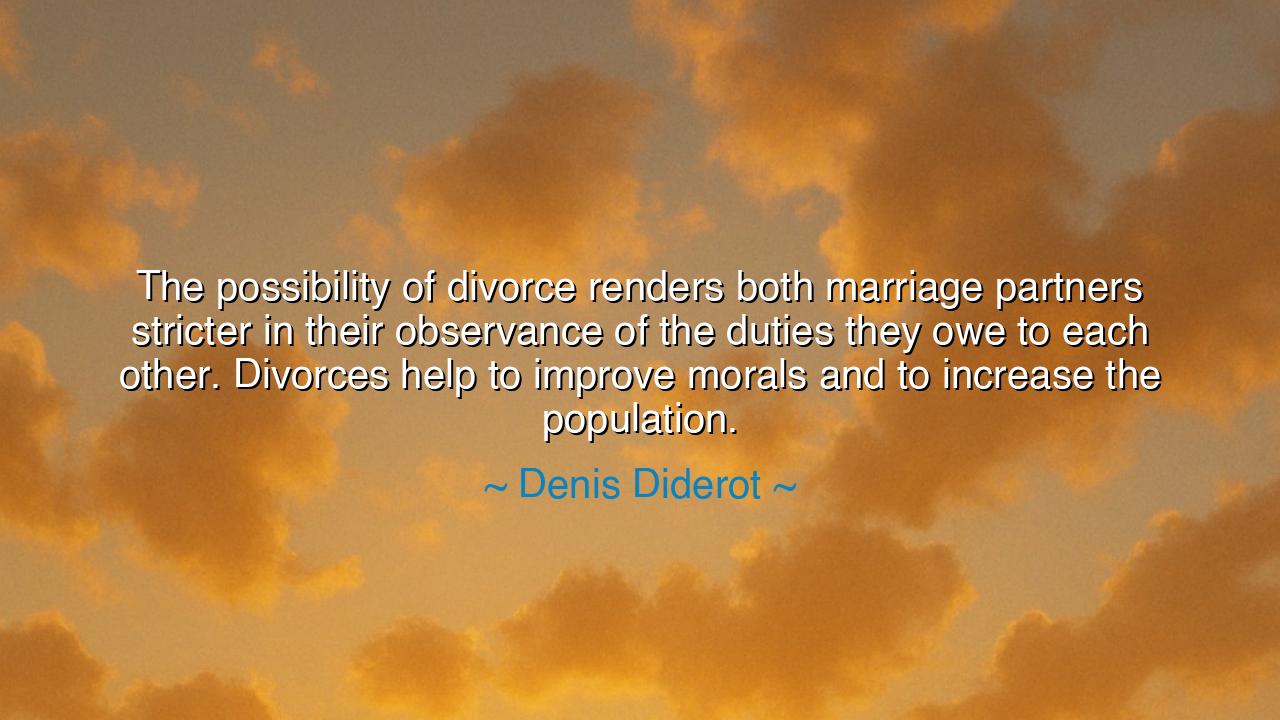
The possibility of divorce renders both marriage partners
The possibility of divorce renders both marriage partners stricter in their observance of the duties they owe to each other. Divorces help to improve morals and to increase the population.






In the scrolls of wisdom and through the great voices of those who have walked before us, we learn that human relations, especially the sacred union of marriage, are fraught with complexities. The binding of two souls, though a divine and noble endeavor, is not without its trials. Denis Diderot, the great philosopher of the Enlightenment, offers a thought that stirs the very core of the union of hearts: "The possibility of divorce renders both marriage partners stricter in their observance of the duties they owe to each other. Divorces help to improve morals and to increase the population." These words, though seemingly paradoxical, carry within them a profound truth about the nature of commitment, freedom, and the eternal balance between personal desire and shared duty.
What Diderot is telling us is that the threat of separation, the looming reality of divorce, acts not as a weapon that destroys but as a force that strengthens. In the ancient world, the bond of marriage was often seen as eternal, unbreakable, something that once forged could not be undone. But what Diderot reveals is that when one knows the possibility of freedom—the choice to walk away, to end the union—the stakes of the relationship are raised. Partners in marriage are driven to be more conscious, more thoughtful, and more attentive to the duties they owe each other, for they know that complacency and neglect will lead to the unraveling of the very fabric of their union. The mere knowledge of this possibility compels them to strengthen their bond, to work harder at preserving the sacred trust between them.
This notion finds its roots in the understanding of freedom as a motivating force in human life. In the same way that a kingdom, when ruled with an iron fist, may grow complacent, so too may marriage stagnate under the weight of assumed permanence. But when there is the freedom to choose otherwise, both parties in the union are forced to confront the fragility of the connection and to cherish it all the more. Just as a warrior who faces the ever-present threat of defeat will sharpen his sword and hone his skills, so too will the marriage partners, under the shadow of divorce, seek to ensure that their relationship remains strong, vibrant, and fulfilling.
Consider the ancient story of Cleopatra and Julius Caesar—two figures bound not just by love but by politics, a union that was at once passionate and fraught with power dynamics. Though they never married, their bond led to the birth of Caesarion, a symbol of their union. Yet, in the face of political strife and shifting allegiances, both would be tested by the very nature of their freedom. Caesar, though a powerful man, knew that even the mightiest empire could collapse in the face of betrayal, and Cleopatra, a queen with a people to lead, understood that no union, however sacred, could survive without the careful nurturing of respect, duty, and mutual sacrifice. They faced the possibility of separation, and though their love was complicated by ambition, they were compelled to give their utmost to preserve it. In their story, we see the true lesson: even the greatest of unions, when faced with the possibility of loss, are compelled to be more attentive, more dedicated, more loving.
Furthermore, Diderot’s words also imply that divorce, while often seen as a failure, is not without its positive effects. For as marriages dissolve, the individuals within them are freed to seek new unions, to bring forth new life, and thus to contribute to the population. In this way, divorce is seen not just as an end, but as a catalyst for new beginnings. In the natural world, the cycle of life and death, of creation and destruction, is necessary for the flourishing of the whole. Just as the seed must fall and return to the earth to give birth to a new plant, so too do broken unions pave the way for new life, new relationships, and, ultimately, a stronger community.
Let us then take these teachings to heart. Marriage, in all its complexity, demands more than mere endurance. It demands commitment, yes, but also awareness. In our own unions, let us not take for granted the bond we share with our partners. Let us recognize that the threat of separation, while painful, can also be a blessing—a reminder to treat each moment, each gesture, each word with the utmost respect and care. In this, we will find not only stronger marriages but also stronger individuals, each capable of growing, learning, and loving more deeply.
Thus, let us embrace the wisdom of Diderot: that the knowledge of possible loss can ignite the flame of devotion, that the possibility of divorce can indeed sharpen the edges of love. In freedom, in the acknowledgment of impermanence, we find our true commitment. And in this, we do not just preserve the sanctity of marriage but ensure the flourishing of future generations, where love, respect, and new life will always find a place to grow. Let us hold these truths close, and in all our relationships, strive to be better, more present, more attuned to the sacred duties we owe one another.






AAdministratorAdministrator
Welcome, honored guests. Please leave a comment, we will respond soon